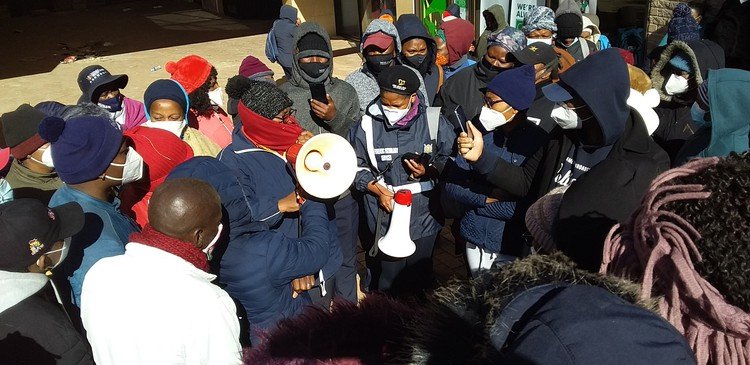By LOYISO DYONGMAN
More than 2 700 community health workers in the Eastern Cape, including Makhanda, are expected to lose their jobs when their contracts end on 31 March. The provincial Department of Health says it does not have funds to extend their contracts due to severe budgetary constraints.
The health department’s media liaison officer, Mkhululi Ndamase, said the department’s serious budgetary constraints arose from two main factors: the historical lump sum, upfront settlement of medico-legal claims and fiscal consolidation implemented across the public sector.
“Regretfully, it has not been possible to offer permanent employment to all the contract workers who were employed to bolster our workforce to respond to the Covid pandemic,” said Ndamase.
These workers earn a stipend of about R3700 a month and are employed on fixed-term, 12-month contracts. They work Monday to Friday in communities across the country.
Thandazile Ngemntu from Makhanda, who said she had been a Community Health Worker for more than ten years, said she conducts home visits every week. She said they provide basic medical care and wash patients that can’t walk to the clinics.
“We are without transport and are walking all the time. The department does not see all the difficult work that we do, even on cold and rainy days,” said Ngemntu.
Another health worker who wished to remain anonymous said the money they were getting made a difference in their lives. “It was not big money, but we were able to cover basic things at home. I stay with my mother, my wife and two kids. We were all depending on this money. I don’t know what we are going to eat and kids when they come back from school,” they said.
Anelisa Mzalazala said she has been with the department for about six years. She said she managed to assist her younger sibling, who attended school with the money over the years. “My two younger siblings looked up to me for help with school uniforms. The situation is going to be worse now. I don’t know why the department does not seek funds from national or private companies,” said Mzalazala.
National Education, Health and Allied Workers’ Union (NEHAWU) has asked the national government to intervene to prevent a healthcare crisis in the Eastern Cape.
Ndamase said the Department would prefer to have permanent employees on its payroll; however, he said the Department is also compelled to remain within its allocated budget.
“Some healthcare workers have been permanently employed after applying when vacancies became available.
“The Department has had ongoing engagements with the Office of the Premier, Treasury, the National Department of Health and Right to Care with the view of sourcing funding for healthcare workers who have been on the frontlines in the fight against COVID-19,” said Ndamase.
He confirmed that there is currently a staff shortage at the department. “Staff shortage is a serious challenge, and the department has consistently applauded the workers who have gone above and beyond the call of duty to ensure we continue delivering quality services to the millions of people who rely on the department for their health needs. We don’t expect, at this time, to have any facilities being closed as a result of staff shortage.
“To address this, the department continues to fill vacant funded posts within available budgets.
“We are committed to ensuring that where there are vacancies and there is a budget, those vacancies will be filled as a matter of urgency to ensure our hard-working and dedicated staff are not overwhelmed,” said Ndamase.


